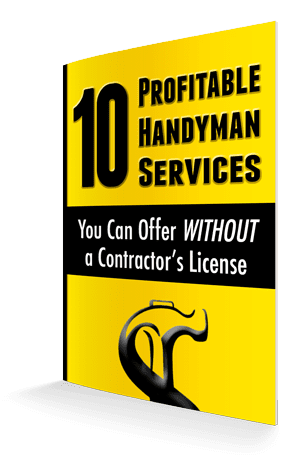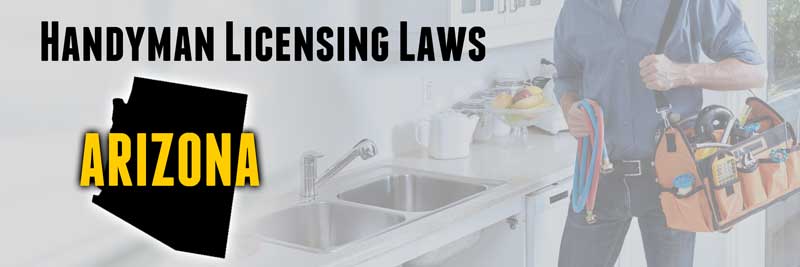If you’re considering offering handyman services in Arizona, it’s essential to understand the local laws. In this article, you’ll learn what you need to know to start offering home repairs in Arizona. I’ve poured over hundreds of pages of difficult-to-understand legal jargon and pulled out the critical information you need. Here it is.
Do you need a license to offer handyman services in Arizona?
It depends on the services you’d like to offer.
A license is needed for jobs that require a permit or if the project cost (including labor & materials) exceeds $1K.
A license is NOT required for projects that don’t require a permit, AND the total cost is less than $1K.
Which jobs require a permit? This varies by municipality, with information available through each city hall’s planning and development department.
Arizona Handyman Limitations & Restrictions
An unlicensed handyman in Arizona can perform a wide range of services if the project costs less than $1,000, including labor and materials.
You cannot break a project into smaller components to meet the $1,000 limit.
Let’s unpack this a bit, as this is a gray area. While you technically could call a bathtub installation one project, then return later to tile around the tub and consider this a new, separate project in an effort to work around the $1,000 per project maximum, that will put you at risk with the law. Since both projects are part of the same bathroom remodel, it would be considered the same project.
Additionally, an unlicensed handymen cannot act as a subcontractor or work on part of any project that exceeds the $1K limit. For example: if a customer is remodeling their kitchen and has several contractors working on the project, you wouldn’t be able to perform any parts of that project even if your bill to the customer is under $1,000.
This all might seem like a deal-breaker if you’re thinking of starting a home repair business, but Arizona is a relatively handyman-friendly state. For example, in most states, you must have a contractor’s license to perform any plumbing, electrical, and HVAC tasks. But in Arizona, you can do several tasks that fall under these umbrellas without a contractor’s license (as long as the total cost is below $1K, of course).
That means you can provide many services and run a surprisingly profitable business – without dealing with the headache and cost of getting a license. You can fix fences, doors, drywall, hang TVs, repair appliances, install ceiling fans, repair toilets, install light fixtures, replace garbage disposals, and hundreds of other high-demand services.

FREE REPORT: “10 Profitable Handyman Services You Can offer WITHOUT a Contractors License”
Stop waiting and start making money with these 10 profitable services anybody can offer.
Advertising Restrictions for Handymen in AZ
Promoting unlicensed handyman services is lawful in Arizona as long as the phrase “Not a Licensed Contractor” is included in all advertisements. Further, you can offer as many under $1,000 services as you choose as long as you don’t promote yourself as a “contractor.” Advertising yourself as a “Handyman” probably isn’t a problem. But if you start calling yourself a plumber, electrician, or other licensed contractor, you’ll be at risk of a run-in with the law.
Licensed contractors are required to list their ROC (Registrar of Contractors) license number on ALL documents used with prospects and customers (in addition to advertising, this includes letterhead and billing). The exceptions are broadcasts, social media, and billboards that direct viewers to a web address with prominently displayed license information.
More details can be found on the advertising page of Arizona’s Registrar of Contractors website.
Loopholes for Unlicensed Arizonan Handymen
Unlike California, which offers exemptions to unlicensed handymen when work doesn’t become a fixed part of a structure (think: furniture assembly, picture hanging, yard cleanup), Arizona has no such loophole. The $1K cap holds, regardless of where and how the job is performed.
What happens if you get caught contracting without a license?
Contracting without a license is usually a misdemeanor. Unlicensed contractors face fines and potential administrative fees of $200 to $15,000. Subsequent violations increase criminal penalties and fines, including jail time.
Most states are clamping down on unlicensed workers.
Bottom line: work within the law or obtain your handyman license. The penalties just aren’t worth it.
Becoming a Licensed Handymen
If you want to become a licensed handyman, then you must obtain a R-62 license: Minor Home Improvements. Let’s take a deeper look into this classification.
R-62: Minor Home Improvements
For projects of $5,000 or less, including labor and materials, this classification allows the licensed handyman to perform remodeling, repairs, and improvements to existing structures. This license does not allow for structural work to any existing structures, including load bearing masonry or concrete work (except on-grade flat work) and load-bearing carpentry work (except for patio or porch covers). Additionally, any work related to electrical, plumbing, air conditioning systems, and boilers that require rerouting must be subcontracted to an appropriately licensed contractor.
Rerouting is the key word here. Handymen are allowed to work to the “point of contact,” a term used by the Arizona Registrar of Contractors Licensing Department representative I spoke with. This means that while you can install and connect a sink to existing pipes, you can’t move the sink to the opposite side of the room, rerouting the plumbing. Ditto for light fixtures – a new one can be installed and reconnected to the same place with existing wiring, but the fixture can’t be moved and rewired. For more details about license classifications available to contractors in Arizona, visit the Arizona Registrar of Contractors.
Two important notes: Handyman (R-62) licensing in Arizona applies strictly to residential homes. The maximum-sized property Arizonan licensed handymen can work on/in are duplexes. R-62 licensing excludes work on/in apartment buildings. Also to keep in mind: projects for licensed handymen must stay within the $5K cap.
Applying for a Handyman License in Arizona
One thing I love about Arizona, is that you don’t need any experience to apply for a R-62 license. As long as you can pass the exam, you are good to go. Many states require several years working as a journeyman before you can even apply.
To obtain a handyman license you need the following:
- Completed application
- Background check
- Passed exam
- Completed Bond
The Arizona Registrar of Contractors lays out the qualifications step-by-step, with links to fees. Expect to pay around $900 in total, with a renewal fee of $540 every two years. To connect directly to the license application page on Arizona’s ROC, click here.
Conclusion
You don’t need a contractor’s license to run a profitable handyman business in Arizona. There are plenty of minor repairs and improvements that you can legally perform within the $1,000 limit.
That means you can get started today, test the waters, and if you get more serious, easily obtain an R-62 license. This would allow you to tackle projects up to $5,000 and work as a subcontractor.
As I mentioned above, the laws in Arizona are very friendly for Handymen. If you want to start a handyman business, Arizona is a great state to live in.
